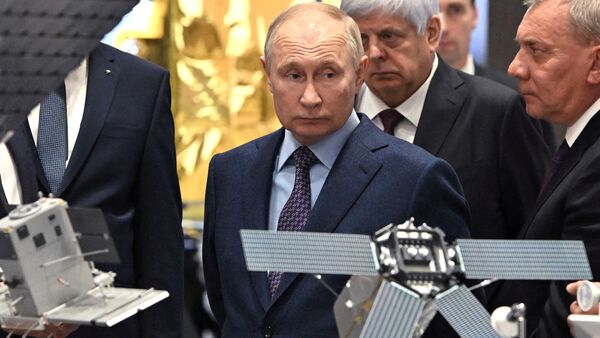In a move that signals Russia’s growing ambitions in space-based infrastructure, the Russian space agency Roscosmos has confirmed that the first group of satellites for its upcoming satellite internet constellation—known as “Rassvet”—will be launched in December 2025. The announcement was made by Roscosmos chief Dmitry Bakanov, who stated that the project aims to provide high-speed broadband internet access across Russia and eventually to other countries that may seek alternatives to Western-dominated satellite networks like Starlink.
With the development spearheaded by Bureau 1440, a relatively new but rapidly expanding player in the Russian tech sector, the project is set to mirror the capabilities of Elon Musk’s Starlink, which currently leads the global market in satellite-based internet services. Rassvet (Russian for “dawn”) could mark the beginning of a significant shift in the global internet landscape where the western global hegemony will now be challenged even in space.
Why Russia Is Building Its Own Starlink
Russia’s motivation for launching its own satellite internet constellation is rooted in both pragmatic needs and geopolitical calculations.
On a practical level, large portions of Russia’s vast and often harsh territory remain underserved by traditional broadband infrastructure. Laying fiber optic cables across Siberia, the Arctic, or sparsely populated regions is not only costly but in some cases logistically impossible. A constellation of low-Earth orbit (LEO) satellites could bridge this gap, offering reliable internet access from above.
However, the real driver behind Rassvet is strategic. The Russian government views foreign-controlled satellite constellations—especially those like Starlink, which are operated by U.S.-based companies and potentially linked to U.S. defense infrastructure—as a serious threat to national security. During the ongoing war in Ukraine, Starlink has played a pivotal role in ensuring battlefield communication, enabling drone coordination, and maintaining internet access even in areas where terrestrial networks were destroyed.
This dual-use functionality of satellite internet—civilian and military—has not gone unnoticed in Moscow. By building its own independent satellite network, Russia aims to secure its communication lines, reduce dependence on foreign technology, and gain the capability to offer services to allied nations who may also wish to avoid Western oversight or potential surveillance.
The Rassvet Project: Technical Overview and Timeline
The Rassvet constellation is still in its early stages, but the vision is grand. Russia plans to launch over 900 satellites by 2035, with more than 250 satellites expected to be in orbit and operational by 2027. The first launch, slated for December 2025, will mark the start of this rollout, with several satellite groups to follow over the next few years.
The satellites will orbit in low Earth orbit (LEO), which is typically below 2,000 km in altitude. LEO is preferred for low-latency communication and global coverage. While early satellites will primarily offer domestic coverage, the long-term ambition is to build a global network that rivals not only Starlink but also upcoming projects from China, the European Union, and private players like Amazon.
Initial prototypes have already been tested, and Bureau 1440 is reportedly working on integrating inter-satellite laser links, a critical technology that allows satellites to communicate with each other in space, reducing dependence on ground stations and improving data speed and reliability.
Starlink’s Global Lead—and Why It Worries Russia
Elon Musk’s Starlink has already deployed more than 6,000 satellites as of 2025, providing internet services in over 70 countries. It has proven its value in remote and rural regions, as well as in disaster zones and conflict areas where terrestrial internet infrastructure is unavailable or compromised.
Russia’s concern isn’t limited to technological competition—it’s about control. Starlink operates beyond the jurisdiction of most national regulators. In Ukraine, despite not being formally licensed, Starlink terminals have enabled military and civilian communication even in Russian-occupied areas. This ability to circumvent local restrictions is both a strength for users and a nightmare for governments seeking control over their information environments.
Furthermore, Starlink’s integration into U.S. military contracts, including potential future battlefield use cases, adds to the suspicion. Russian defense experts argue that any foreign-controlled network in the sky could be weaponized in a conflict, either by providing intelligence or by being denied to adversaries during wartime.
A Global Trend: Other Countries Building Their Own Constellations
Russia is not the only country taking notice of Starlink’s capabilities—and acting on it.
China is rapidly developing its Guowang constellation, which could include up to 13,000 satellites, as well as other related projects like Hongyan and Honghu-3. Beijing aims to establish full digital sovereignty and challenge Starlink on a global scale, including in markets where Western systems are restricted.
The European Union is working on IRIS², a secure satellite communication initiative designed to provide encrypted, government-grade connectivity across the EU and potentially to its global partners. The goal is to ensure Europe is not left dependent on American or Chinese infrastructure.
Amazon is preparing to launch Project Kuiper, which will see over 3,000 satellites launched by the end of the decade. While primarily commercial, Amazon’s network may have defense applications in the future, especially given its partnerships with the U.S. government.
As more countries and corporations enter the satellite internet space, what was once a niche technology is fast becoming a pillar of digital and military infrastructure.
Satellite internet is no longer just about watching Netflix in the mountains. It has evolved into a geopolitical asset—a tool for digital influence, military capability, and global outreach. Countries that control these networks will hold the keys to communication in times of war, natural disaster, and political upheaval.
For Russia, Rassvet represents not just a technological leap, but a declaration: that information control, like energy, must remain in national hands. As the digital world moves skyward, the race to dominate low-Earth orbit is no longer a hypothetical arms race—it’s already underway.








